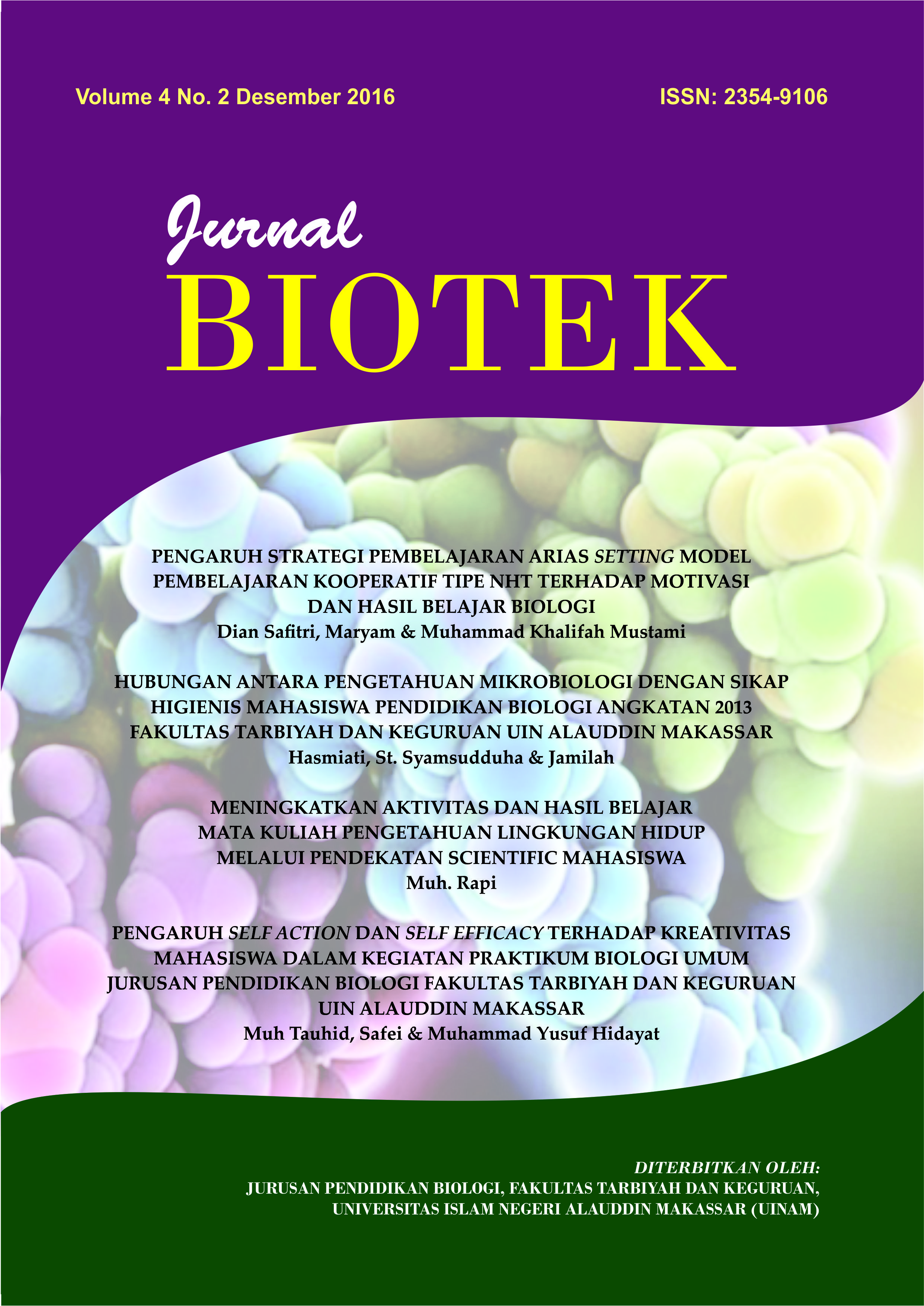ANALISIS KESULITAN MAHASISWA MENGHAFAL NAMA-NAMA LATIN DI PROGRAM STUDI PENDIDIKAN BIOLOGI ANGKATAN 2014 FAKULTAS KEGURUAN DAN ILMU PENDIDIKAN UNIVERSITAS MUHAMMADIYAH PAREPARE
Abstrak
The research was conducted at the University of Muhammadiyah Parepare the Faculty of Education Biology Education Studies Program Specifically Force 2014. The research used quantitative descriptive research type. Subjects of this study Latin names while the object of this study are students. Further data are obtained by using a structured interview and documentation. Then the data were analyzed using descriptive analysis techniques. The results of this study indicate that: (i) a description of the student's knowledge of Biology Education 2014 Forces of Latin names can be said that the students had difficulty in memorizing the Latin names. It can be seen on the picture of the student's knowledge of Latin names, the average percentage of correct answers as much as 40.24% and the percentage of wrong answers as much as 57.76%. (Ii) a description of the difficulties faced by students in memorizing the Latin names in Biology Education Studies Program Force 2014 is the complicated pronunciation answered by 39 students from 52 students with a percentage of 75%. While more dominant for many groupings of Latin names were answered by 50 students from 54 students with a percentage of 96.2%. As for the memjawab that trouble memorizing the Latin names due to the low recall that 30 students from 52 the number of students with a percentage of 57.7%. (Iii) Methods of Biology Education Students Force 2014 in memorizing Latin names are repeated with a percentage of 86.5% and 57.7% make keyword.
##plugins.generic.usageStats.downloads##
Referensi
Khoir HS, Abdul. (2008). Jurnal LPPM: Paradigma Vol 9, No 01 (2008): Universitas Islam “45” Bekasi.
Ahmadi, Abu. (2004). Cara Belajar Yang Mandiri dan Sukses. Solo: C.V. Aneka.
Matthews, Andrew. (2004). Being Happy Kiat Hidup Tentram Dan Bahagia. Jakarta: PT Gramedia Pustaka Utama.
Aunurrahman, (2009). Belajar dan pembelajaran. Bandung: Alfabeta
De Potter, Bobby. (2005) Quantum Teching. Jakarta: Kaifa.
Djamarah, Syaiful Bahri. (2002). Rahasia Sukses Belajar. Jakarta: PT Asdi Maha Satya.
Kuswana, Wowo Sunaryo. (2011). Taksonomi Berpikir. Bandung: PT. Remaja Rosda karya.
Syah, Muhibbin. (2010). Psikologi Pendidikan dengan Pendekatan Baru (Edisi revisi). Jakarta: PT. Remaja Rosdakarya.
Sarwono, Sarlito W. (2005). Pengantar Umum Psikologi. Jakarta: Bulan Bintang.
Sugiyono. (2008). Metode Penelitian Bisnis. Bandung: Pusat Bahasa Depdiknas.
Sugiyono. (2010). Metode penelitian pendidikan: pendekatan kuantitatif, kualitatif, dan R&D. Bandung: Alfabeta.
Suharso dan Retnoningsih, Ana. (2009). Kamus Besar Bahasa Indonesia. Semarang: Widya Karya.
Surya Sumantri, Jujun S.(2003). Filsafat Ilmu, Sebuah Pengantar Populer, Cet XVII, Jakarta: Pustaka Sinar Harapan.
Syamsiah. (2006). Buku Ajar Taksonomi Tumbuhan Tinggi. Makassar: Badan Penerbit UNM.
Tohirin. (2007). Bimbingan dan Konseling di Sekolah dan Madrasah (berbasis integrasi). Jakarta: Raja Grafindo Persada.
Yovan, P. Purta dan Bayu Issetyadi. (2010). Lejitkan Memori 1000%. Jakarta: Elex Media Komputindo.
Authors who publish with Jurnal Biotek agree to the following terms: Authors retain the copyright and grant Universitas Islam Negeri Alauddin Makassar right of first publication with the work simultaneously licensed under a Creative Commons Attribution License (CC BY-SA 4.0) that allows others to share (copy and redistribute the material in any medium or format) and adapt (remix, transform, and build upon the material) the work for any purpose, even commercially with an acknowledgement of the work's authorship and initial publication in Universitas Islam Negeri Alauddin Makassar. Authors are able to enter into separate, additional contractual arrangements for the non-exclusive distribution of the journal's published version of the work (e.g., post it to an institutional repository or publish it in a book), with an acknowledgement of its initial publication in Universitas Islam Negeri Alauddin Makassar. Authors are permitted and encouraged to post their work online (e.g., in institutional repositories or on their website) prior to and during the submission process, as it can lead to productive exchanges, as well as earlier and greater citation of published work (See The Effect of Open Access).

This work is licensed under a Creative Commons Attribution-ShareAlike 4.0 International License.



